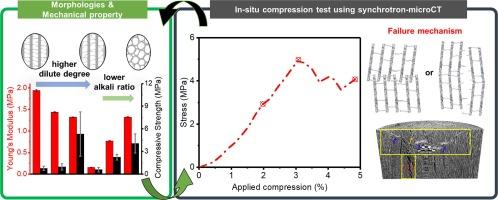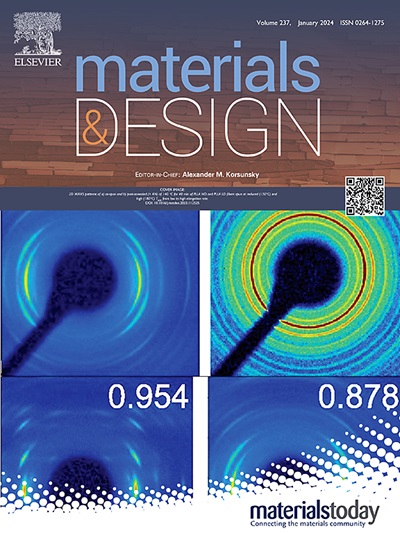Insights into freeze-cast hierarchical water–glass foams via in situ time-lapse phase-contrast enhanced microcomputed tomography: Correlating composition, microstructure, and compression failure
IF 7.6
2区 材料科学
Q1 MATERIALS SCIENCE, MULTIDISCIPLINARY
引用次数: 0
Abstract
We demonstrate how continuous freeze-casting without post-treatment sintering may be successfully employed using a pure water–glass (WG) solution to fabricate hierarchically porous foams lacking a morphology gradient along the freeze direction. By adjusting the water content (dilution) and/or the alkali ratio of the solution, we achieved lamellar structures with sub-features or cellular structures, with porosities spanning ∼65% to 83%. The WG foams exhibit astounding mechanical properties; notably, foams with a relatively low density of ∼0.33 g/cm3 demonstrated the highest compressive strength (5 MPa), due to their microstructure and pore morphology. In situ uniaxial compression tests combined with phase-contrast enhanced micro-computed tomography in a synchrotron revealed bending, buckling, fracture and splitting of the lamellar structures as main failure mechanisms. Our newly developed approach of continuous freeze-casting of pure WG solutions with an improved understanding of the relationship between composition, structure, and failure mechanisms provide a basis for a customized design and manufacture of a wide range of freeze-cast WG-based materials for applications ranging from biomedicine to energy generation and storage.

通过原位延时相位对比增强微计算机断层扫描深入了解冷冻铸造分层水玻璃泡沫:将成分、微观结构和压缩失效联系起来
我们展示了如何使用纯水玻璃(WG)溶液成功地进行无后处理烧结的连续冷冻铸造,以制造沿冷冻方向缺乏形态梯度的分层多孔泡沫。通过调整溶液的含水量(稀释)和/或碱比例,我们获得了具有亚特征或蜂窝结构的片状结构,孔隙率从 65% 到 83%。WG 泡沫表现出惊人的机械性能;尤其是密度相对较低的∼0.33 g/cm3 泡沫,由于其微观结构和孔隙形态,显示出最高的抗压强度(5 兆帕)。原位单轴压缩试验结合同步加速器相位对比增强微型计算机断层扫描显示,层状结构的弯曲、屈曲、断裂和分裂是主要的破坏机制。我们新开发的纯 WG 溶液连续冷冻铸造方法,以及对成分、结构和失效机制之间关系的深入理解,为定制设计和制造各种基于 WG 的冷冻铸造材料奠定了基础,这些材料的应用范围从生物医学到能源生产和存储。
本文章由计算机程序翻译,如有差异,请以英文原文为准。
求助全文
约1分钟内获得全文
求助全文
来源期刊

Materials & Design
Engineering-Mechanical Engineering
CiteScore
14.30
自引率
7.10%
发文量
1028
审稿时长
85 days
期刊介绍:
Materials and Design is a multi-disciplinary journal that publishes original research reports, review articles, and express communications. The journal focuses on studying the structure and properties of inorganic and organic materials, advancements in synthesis, processing, characterization, and testing, the design of materials and engineering systems, and their applications in technology. It aims to bring together various aspects of materials science, engineering, physics, and chemistry.
The journal explores themes ranging from materials to design and aims to reveal the connections between natural and artificial materials, as well as experiment and modeling. Manuscripts submitted to Materials and Design should contain elements of discovery and surprise, as they often contribute new insights into the architecture and function of matter.
 求助内容:
求助内容: 应助结果提醒方式:
应助结果提醒方式:


